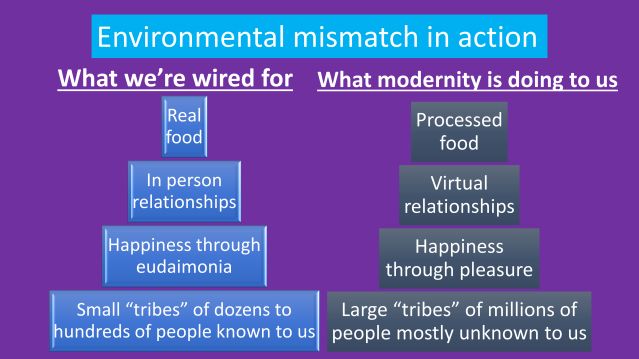Environment
Environmental Mismatch: Why Modernity Is Making Us Sick
What our past tells us about being happier and healthier in the 21st century.
Posted June 29, 2024 Reviewed by Ray Parker
Key points
- Modern life offers marvels but has not been good for our physical and mental health.
- Environment mismatch occurs when our genes become misaligned with our environment.
- The mismatch model also suggests practical ways to be healthier and happier in modernity.
Modern life sometimes seems like a paradox. Americans from the 18th and 19th centuries would be astounded to witness America in 2024. We can drive electric cars instead of riding horses. We live and work in multistory homes and skyscrapers instead of log cabins. We communicate in real-time with others through our artificial intelligence (AI)-powered smartphones instead of sending handwritten letters via the Pony Express. And we can enjoy our evenings on TV watching companies like SpaceX launch and land rockets as practice for a mission to Mars. I hope you pause and occasionally reflect on the progress we've enjoyed in recent decades. It borders on the absurd.
Yet, for all our modern wonders, we can't seem to engineer happiness or health. In fact, research suggests just the opposite: even as we're experiencing exponential progress in technology, we are regressing in human prosperity1-2. To many, this defies expectations. To others, it suggests a terrifying glimpse of the future. If this pattern remains, our technology might reach Jetson-level heights in the decades to come, yet we might be too sick and miserable to enjoy it.
I'd like to offer a novel explanation for this paradox that offers some practical steps for eating your cake (enjoying the perks of modernity) while having it too (keeping your health and sanity).
Specifically, we'll answer the following questions about modern problems:
- Why have we rapidly become so overweight and unhealthy?
- Why do we seem to be increasingly vulnerable to anxiety and depression?
- Why is social media so toxic for us individually and as a society?
To get right to the punchline, the answer to these seemingly different problems is the same: They result from an environmental mismatch. We'll see if you agree by the end of this post.

Brief Background
According to evolutionary theory, organisms best suited to the challenges of their environment will tend to survive and reproduce. In contrast, those less suited will not ("survival of the fittest," although "fittest" has little association with physical fitness as we usually think of it). Over time, the genes and characteristics best suited to the environment become the norm across the species. This is why, for example, despite people having different ethnic, racial, and cultural identities on the outside, they are genetically almost the same on the inside. Eons of shared evolutionary pressures shaped these similarities.
But what happens when an organism, for example, a human like you and me, who is biologically adapted to a specific set of environmental challenges over many thousands of years, radically changes their environment in just a few decades? We might predict that human could struggle in their new environment despite thriving in their previous environment. This is called an "environmental mismatch" problem. When the organism's genes are no longer adaptive to their environment and may even be maladaptive.
In the 21st century, this environmental mismatch problem appears to be affecting people in alarming numbers in the U.S. and most other advanced countries.
How Environmental Mismatch Explains Modern Health and Happiness Problems
- Why have we recently become so metabolically unhealthy? Because we evolved (e.g., our fat cells, hunger drive, and preference for calorie-dense foods) genetic mechanisms to protect us against an environment of scarcity. But we now live in an environment of abundance. Our scarcity superpowers became our Achille's heel in modernity.
- Why are we so vulnerable to anxiety and depression? Because humanity historically evolved partly as predators and partly as prey animals. Early humans, for instance, were frequently killed and eaten by predatorial animals such as reptiles and large cats (i.e., mountain lions, not Garfield). Being highly sensitive to danger was essential in this hazardous world. Therefore, we evolved powerful emotions such as fear and anxiety to protect us against acute, life-and-death stressors. Note that these emotions evolved to work like a fire alarm to activate only in the case of an emergency. Yet, we now live in a world dominated by chronic, lower-grade stressors. The result is that our fear and anxiety systems are now active far more often than nature intended. The same emotional system that once supported our survival now threatens our mental health.
- Why is social media so toxic for us? Psychologists such as Jonathan Haidt have written and spoken extensively about the harms associated with social media3. From an environment mismatch perspective, however, social media harms can be summarized in a single sentence: social media engages us in virtual relationships with large numbers of unfamiliar people when we evolve for in-person relationships with smaller groups belonging to our same tribes and communities. We're exquisitely wired for eye contact, physical touch, and body language. Virtual relationships minimize or bypass all the biological features we evolved to optimize our connections with others. The consequences are predictable.
Solving the Environment Mismatch Problem
Short of relocating to a deserted island, how can we achieve health and happiness in a world where we did not evolve to live? Perhaps technology (e.g., AI robot companions) and medical breakthroughs (e.g., cheaper and even more effective versions of Wegovy and Zepbound) will save us. Perhaps the Amish or hunter-gatherers like the Hazda will begin accepting applications for new memberships.
Or perhaps most realistically, we can each strive to resist some of the negative impulses of modernity and live in greater alignment with our biological natures. This includes efforts to incorporate specifics such as the following into our modern lifestyles (see above figure):
- Basing our nutrition mostly on real food instead of processed food.
- We should include healthy forms of acute stress in our lives, such as exercise, learning, and person-growth-promoting challenges, for which our stress system evolved.
- Redefine our happiness formula in line with the ancient Greek formula (eudaimonia) based on meaning, connection, growth, and quality.
- Maximize our in-person relationship time, particularly with close friends, family, and intimate partners.
References
1. O'Hearn M, Lauren BN, Wong JB, Kim DD, Mozaffarian D. Trends and Disparities in Cardiometabolic Health Among U.S. Adults, 1999-2018. J Am Coll Cardiol. 2022 Jul 12;80(2):138-151. doi: 10.1016/j.jacc.2022.04.046.


